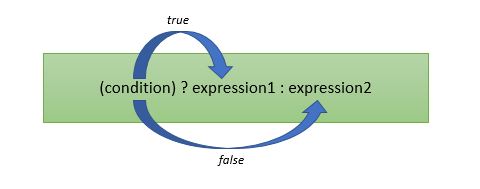C programming conditional operator (?:)
C programming conditional operator is also known as a ternary operator. It takes three operands. Conditional operator is closely related with if..else statement.
Syntax of C programming conditional operator
(condition) ? expression1 : expression2If the condition is true then expression1 is executed else expression2 is executed.

For example:
puts( x > y ? "x is greater" : "y is greater");Here, puts statement contains as its second argument a conditional expression which evaluates to the string "x is greater" if the condition x > y is true and "y is greater" if the condition is false.It can also be done as
It can also be done as
x > y ? puts("x is greater") : puts("y is greater");Here, if x > y then puts("x is greater") else puts("y is greater").
The output of both expressions is same.
[adsense1]
Example: C program to check whether the student is pass or fail using conditional operator
#include <stdio.h>
int main()
{
int mark;
printf("Enter mark: ");
scanf("%d", &mark);
puts(mark >= 40 ? "Passed" : "Failed");
return 0;
}Output
Enter mark: 39 Failed
Explanation
The program checks the condition mark >=40, if it is true "Passed" is printed else "Failed".
The above program can be simply done with the help of if...else statement.
#include <stdio.h>
int main()
{
int mark;
printf("Enter mark: ");
scanf("%d", &mark);
if(mark >= 40)
printf("\nPassed");
else
printf("\nFailed");
return 0;
}
Output
Enter mark: 39 Failed